Between 14 and 15 January 2026, IFRA-Nigeria and the Institute of African Studies, University of Ibadan, will welcome the 2026 International Seminar of the "Gender, Law and Political Activism" project (GLOW).
GLOW 2026 International Seminar Program
Roundtable: project presentation and discussion
Open to all
Join us for a public roundtable where we will present our project and discuss its aims and perspectives with the audience. The speakers include: Dr Mutiat Oladejo, Prof. Tade Oludayo, Prof. Sharon Omotoso, Dr Mofeyisara Omobowale, Prof. Olufunke Adeboye, Dr Marième N'Diaye and Dr Sara Panata.
Date & Time: 14 January, from 9:00 am to 11:00am
Location: Draper's Hall, Institute of African Studies, University of Ibadan
Writing Workshop
Limited availibility, register here
A small-group two-day writing workshop focused on discussing texts.
Date & Time: 14 January, from 2:00 pm to 5:30 pm & 15 January, from 9:00 am to 4:00 pm
Location: Board Room, Institute of African Studies, University of Ibadan
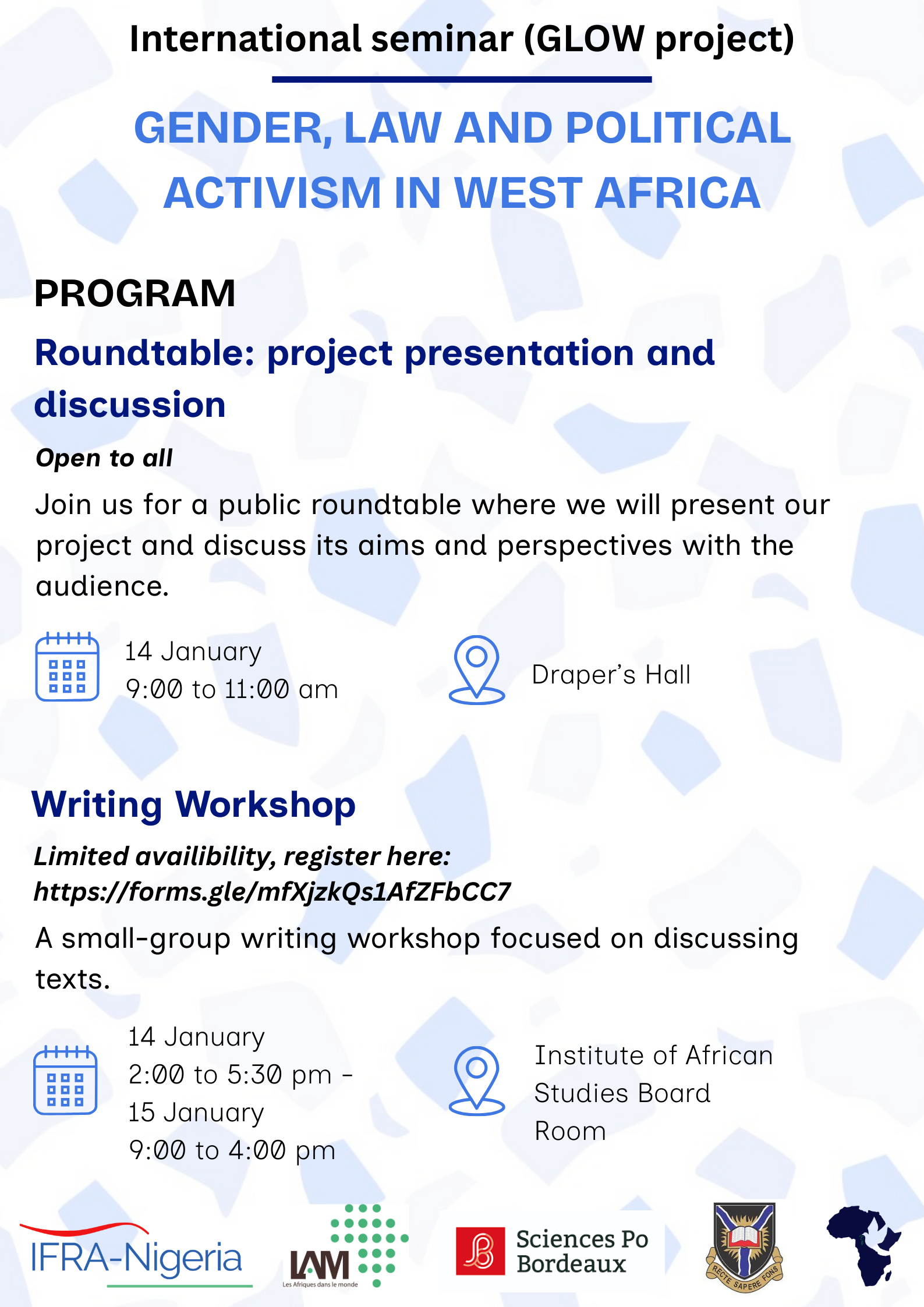
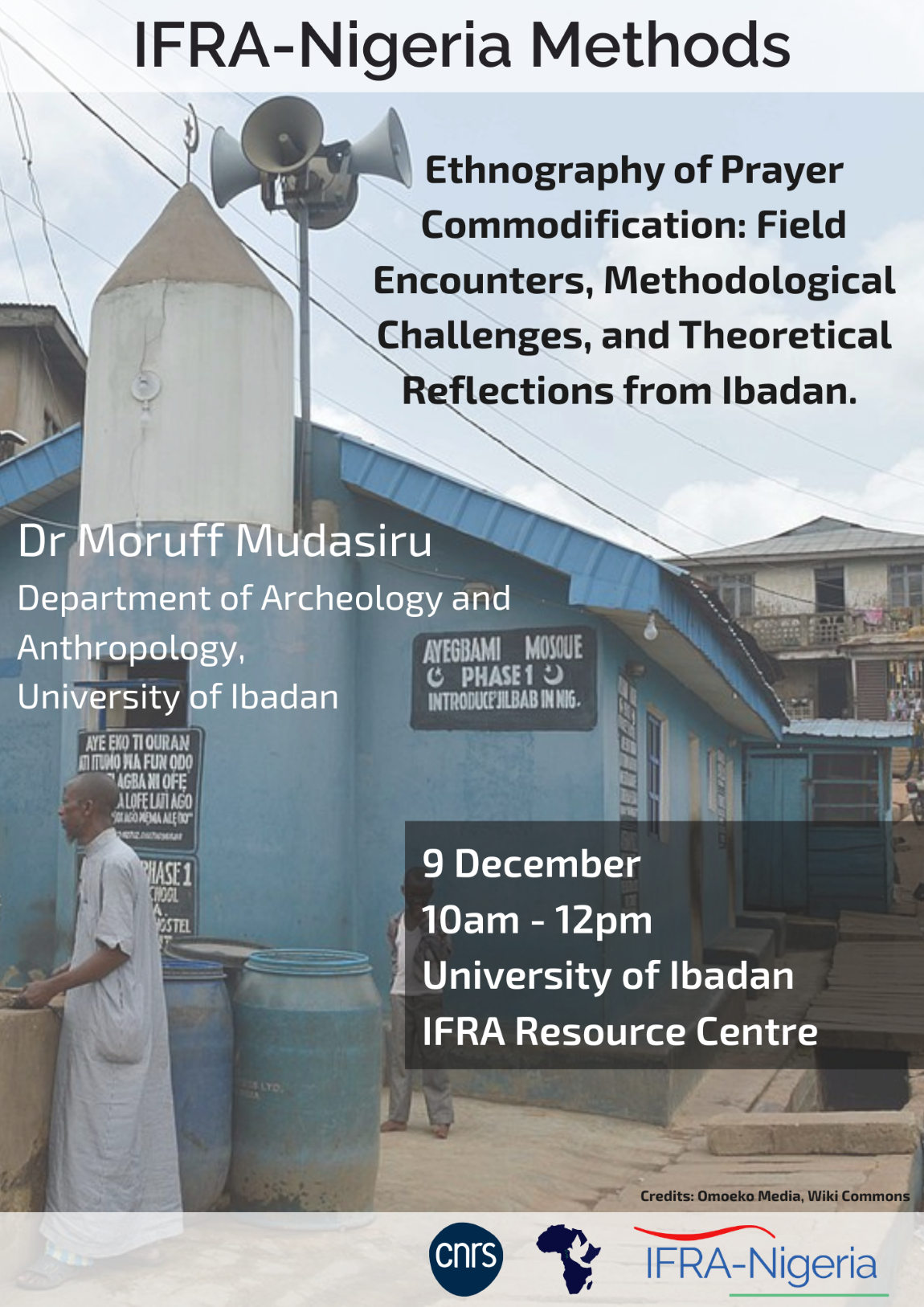 Our next methodological seminar will take place on 9 December 2025. It will feature Dr Moruff Mudasiru, affiliated with the Department of Archeology and Anthropology of the University of Ibadan. He will present on the topic "Ethnography of Prayer Commodification: Field Encounters, Methodological Challenges, and Theoretical Reflections from Ibadan." Drawing on his experience studying Jálàbí, the Islamic petitionary prayer, in Ibadan he will bring the audience through a fieldwork marked by trust-building, ethical dilemmas and unexpected events, and how to practice ethnography in such circumstances. His work also adopts a hermeneutic theory as the framework to interpret the symbolic and economic meanings of prayer practices. It therefore connects with the anthropology of Islam.
Our next methodological seminar will take place on 9 December 2025. It will feature Dr Moruff Mudasiru, affiliated with the Department of Archeology and Anthropology of the University of Ibadan. He will present on the topic "Ethnography of Prayer Commodification: Field Encounters, Methodological Challenges, and Theoretical Reflections from Ibadan." Drawing on his experience studying Jálàbí, the Islamic petitionary prayer, in Ibadan he will bring the audience through a fieldwork marked by trust-building, ethical dilemmas and unexpected events, and how to practice ethnography in such circumstances. His work also adopts a hermeneutic theory as the framework to interpret the symbolic and economic meanings of prayer practices. It therefore connects with the anthropology of Islam.
Practical information
Date & Time: 9 December 2025, 10am-12pm
Location: IFRA-Nigeria Resources Centre, Institute of African Studies, University of Ibadan
Register here before 05/12/2025: https://forms.gle/Xp1SSxsGhWwLo4f69
Continue Reading
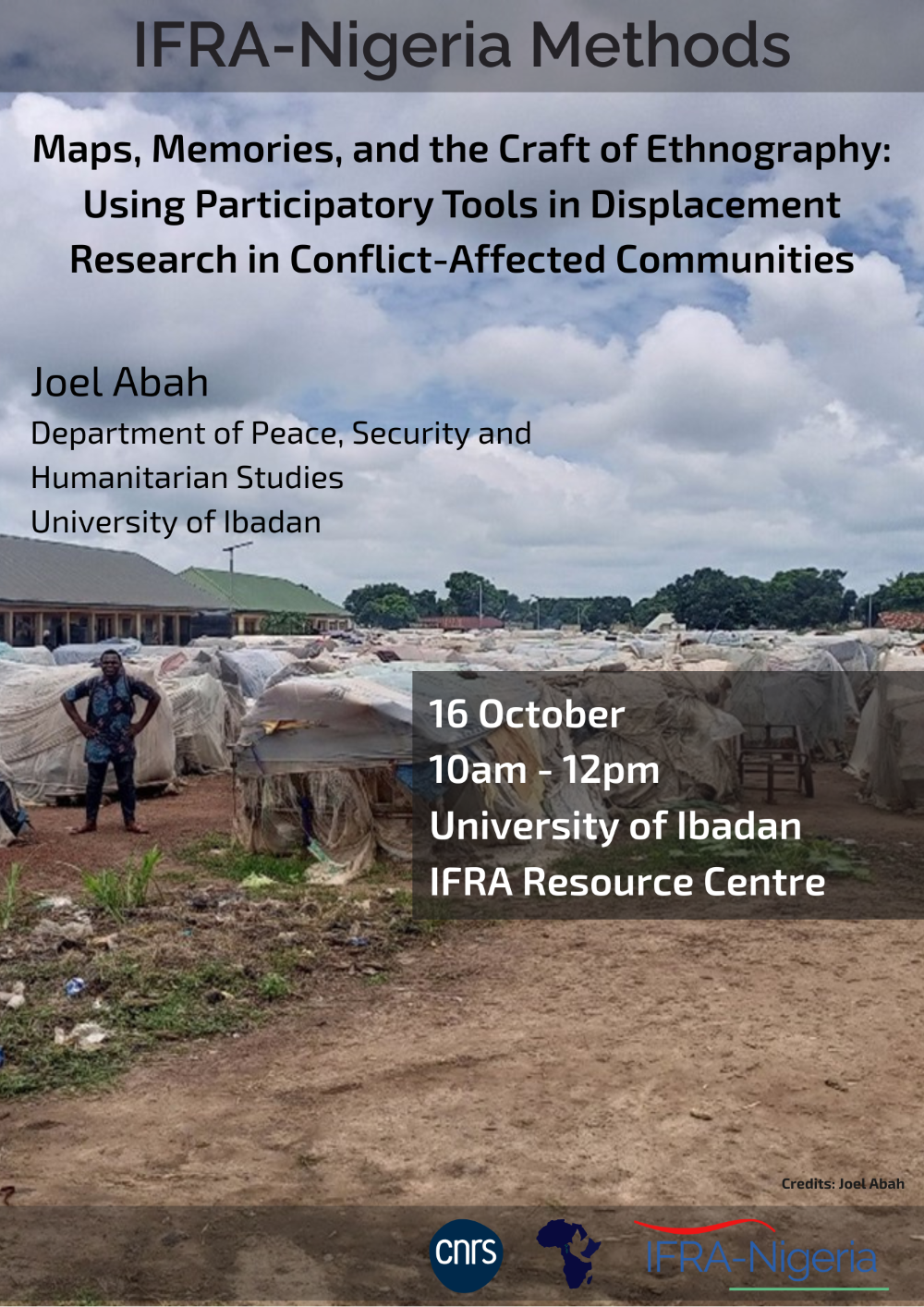 On 16 October, 2025, Joel Abah, doctoral candidate at the Department of Peace, Security and Humanitarian studies at the University of Ibadan, presented his work on communities in Benue displaced camps during our latest methodological seminar "Maps, Memories, and the Craft of Ethnography: Using Participatory Tools in Displacement Research in Conflict-Affected Communities".
On 16 October, 2025, Joel Abah, doctoral candidate at the Department of Peace, Security and Humanitarian studies at the University of Ibadan, presented his work on communities in Benue displaced camps during our latest methodological seminar "Maps, Memories, and the Craft of Ethnography: Using Participatory Tools in Displacement Research in Conflict-Affected Communities".
Continue Reading
 On October 16, we invite you to a methodological seminar on "Maps, Memories, and the Craft of Ethnography: Using Participatory Tools in Displacement Research in Conflict-Affected Communities." Joel Abah, doctoral candidate at the Department of Peace, Security and Humanitarian studies at the University of Ibadan, and Lecturer at Prince Abubakar Audu University will reflect the methodological journey of conducting ethnographic research in displacement camps and conflict-affected communities in Benue State, Nigeria.
On October 16, we invite you to a methodological seminar on "Maps, Memories, and the Craft of Ethnography: Using Participatory Tools in Displacement Research in Conflict-Affected Communities." Joel Abah, doctoral candidate at the Department of Peace, Security and Humanitarian studies at the University of Ibadan, and Lecturer at Prince Abubakar Audu University will reflect the methodological journey of conducting ethnographic research in displacement camps and conflict-affected communities in Benue State, Nigeria.
He will focus on participatory and relational tools, including oral interviews, oral cartography, memory mapping, Geographic Information Systems (GIS), and digital documentation, to demonstrate how these methods emerged in response to challenges of insecurity, vulnerability, and relational dynamics in the field. Through autoethnographic reflection, the session will highlight moments of improvisation, setbacks, and surprises that shaped both access to participants and the iterative development of field-sensitive methods.
Participants will gain insights into how methodological decisions, positionality, and ethical considerations influence data collection and co-production of knowledge in challenging field contexts. The seminar emphasizes research as a craft, illustrating practical, relational, and experimental approaches to ethnography in situations marked by displacement, conflict, and social vulnerability.
Practical information
Date & Time : 16/10/2025, between 10am and 12pm
Venue: IFRA-Nigeria Resource Center, Institute of African Studies, University of Ibadan
Registration: https://forms.gle/A6AJ7bVYFZgetgcb8
Deadline for registration: 10/10/2025
Continue Reading
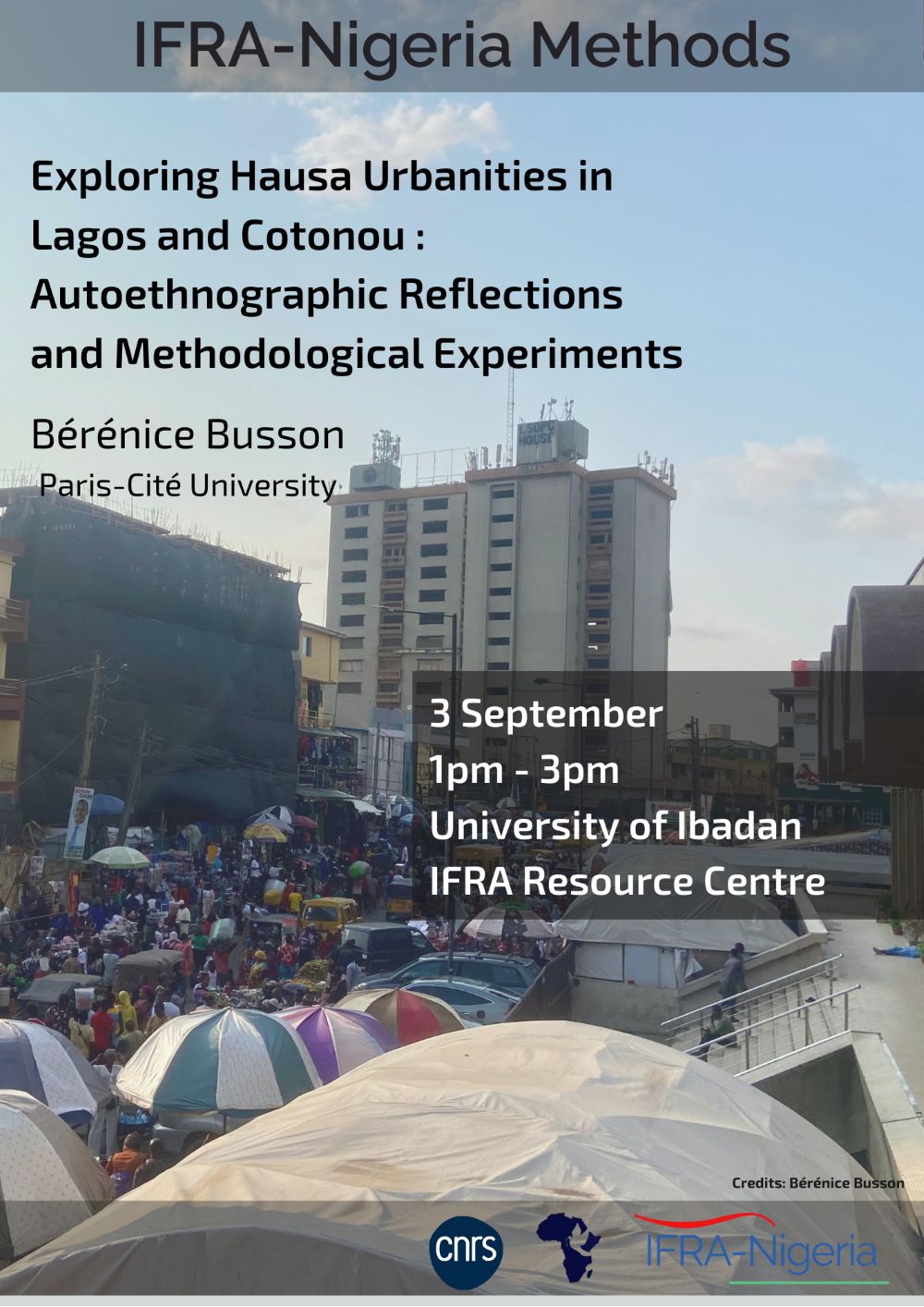 On 3 September 2025, Bérénice Busson, PhD student in geography at the Université Paris Cité (CESSMA Lab), held our first methodological seminar of the 2025-2026 academic year. She talked on "Exploring Hausa Urbanities in Lagos and Cotonou : Autoethnographic Reflections and Methodological Experiments".
On 3 September 2025, Bérénice Busson, PhD student in geography at the Université Paris Cité (CESSMA Lab), held our first methodological seminar of the 2025-2026 academic year. She talked on "Exploring Hausa Urbanities in Lagos and Cotonou : Autoethnographic Reflections and Methodological Experiments".
First, she presented the social position of Hausa, a fluid ethnic group from the Sahelian region, specifically from north Nigeria and south Niger. In Cotonou (Benin Republic), where she began her fieldwork, they are seen as a minority on two accounts : first as a religious minority, being mostly Muslim, and second, they are perceived as strangers from an "underdeveloped" region. On the basis of this observation, she stated her two questions : Considering their different economic background and time staying in the city, how do they negotiate their position in it? How are they coping with potential discriminations or obstacles to urban resources access, being in a subaltern position?
Continue Reading
 Join us on Wednesday, 3 September at 1pm for our first Methodological Seminar of the 2025-2026 academic year. Bérénice Busson, a geography PhD student in georgraphy at the Paris Cité University (CESSMA research lab), will present her work "Exploring Hausa Urbanities in Lagos and Cotonou : Autoethnographic Reflections and Methodological Experiments".
Join us on Wednesday, 3 September at 1pm for our first Methodological Seminar of the 2025-2026 academic year. Bérénice Busson, a geography PhD student in georgraphy at the Paris Cité University (CESSMA research lab), will present her work "Exploring Hausa Urbanities in Lagos and Cotonou : Autoethnographic Reflections and Methodological Experiments".
Her PhD research examines the political urbanities of predominantly male Hausa workers involved in the car trade in Cotonou, Benin Republic, and the textile trade in Lagos, Nigeria. Focusing on their everyday negotiations and interactions within the city, she will discuss her use of ethnographic methods alongside a broader set of qualitative approaches.
In this presentation, Bérénice Busson will also reflect on her positionality as a French female researcher — how it may have influenced the interlocutors, the ways she adapted her research practices in response, and how both the local context and the evolving political environment shaped her fieldwork over time. Finally, she will share her experiments with alternative methodologies, including the use of sensory mapping, video, and photography, and the restitution of the research through a community exhibition held in the Zongo neighborhood.
Practical Information:
Date and time: Wednesday, 3 September, 1pm
Location : IFRA-Nigeria Resources Centre, Institute of African Studies, University of Ibadan.
Sign-up here before 01/9: https://forms.gle/idGzDGTqPkYixMQ97
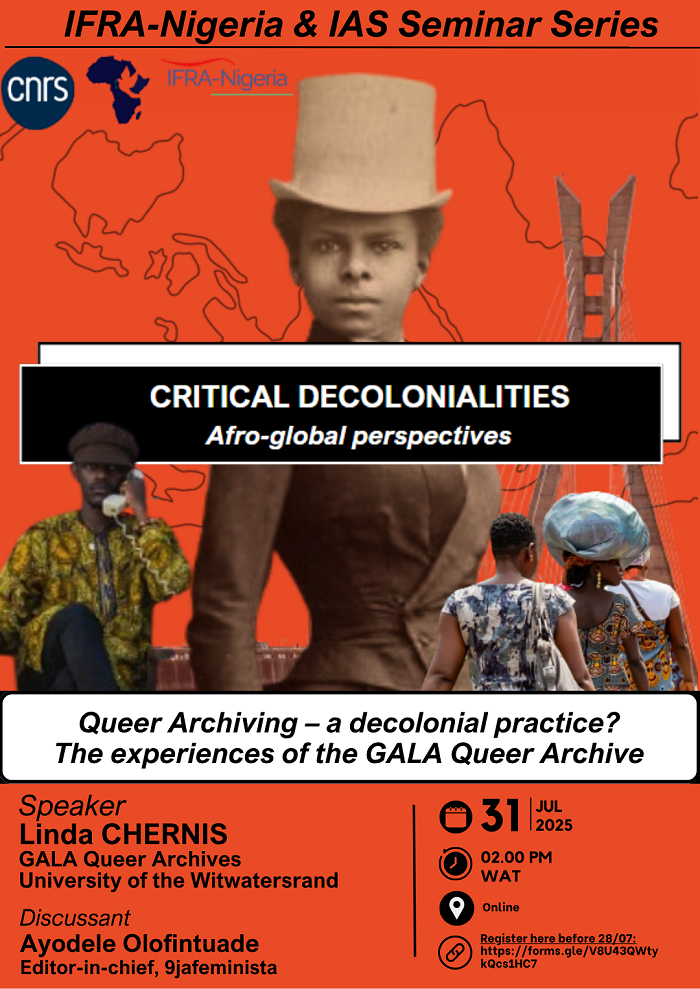 IFRA-Nigeria and the Institute of African Studies are pleased to invite you to another session of the "Critical Decolonialities: Afro-global perspectives" seminar series scheduled for 31 July 2025. This session will feature Linda Chernis, GALA Queer Archives, University of the Witwatersrand, who will present on “Queer Archiving – a decolonial practice? The experiences of the GALA Queer Archive”.
IFRA-Nigeria and the Institute of African Studies are pleased to invite you to another session of the "Critical Decolonialities: Afro-global perspectives" seminar series scheduled for 31 July 2025. This session will feature Linda Chernis, GALA Queer Archives, University of the Witwatersrand, who will present on “Queer Archiving – a decolonial practice? The experiences of the GALA Queer Archive”.
Linda Chernis will discuss ways in which queer histories and archives can be used to challenge dominant perceptions of history and traditional archives, including methods for ‘activating’ the archive, and making it more accessible and inclusive. Being an independent, activist archive that focuses on marginalised voices, she will invite us to constantly rethink how we work and how we add to and adapt from the traditional concept of an archive. In current tumultuous context, it is more important than ever to preserve queer voices, past and present, from the drive towards silencing and erasure that is sweeping large parts of the world.
Continue Reading
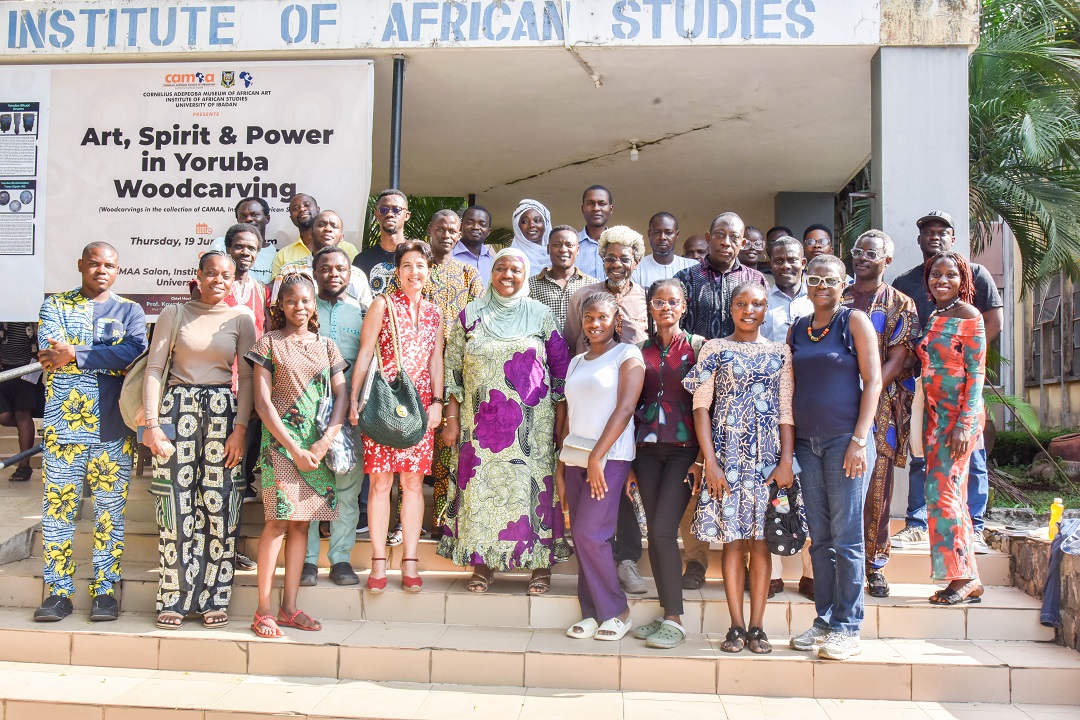 On 25 June, IFRA-Nigeria, in collaboration with the Institute of African Studies, University of Ibadan, hosted Dr Mutiat Titilope Oladejo (Department of History, University of Ibadan) and Dr Ayo Adeduntan (Institute of African Studies, University of Ibadan) for another edition of the “Critical Decolonialities” seminar series. The session, titled “(De)Colonial Dynamics of Science-Based Research at the University of Ibadan (Nigeria), 1962 - 1983,” explored the evolution of science-based research at the University of Ibadan (UI) through the dual lenses of colonial legacies and Afrocentric renewal.
On 25 June, IFRA-Nigeria, in collaboration with the Institute of African Studies, University of Ibadan, hosted Dr Mutiat Titilope Oladejo (Department of History, University of Ibadan) and Dr Ayo Adeduntan (Institute of African Studies, University of Ibadan) for another edition of the “Critical Decolonialities” seminar series. The session, titled “(De)Colonial Dynamics of Science-Based Research at the University of Ibadan (Nigeria), 1962 - 1983,” explored the evolution of science-based research at the University of Ibadan (UI) through the dual lenses of colonial legacies and Afrocentric renewal.
Originally established as part of the British "civilizing mission" in Africa, UI has since emerged as a vital space for interrogating and reshaping the production of scientific knowledge.
Continue Reading
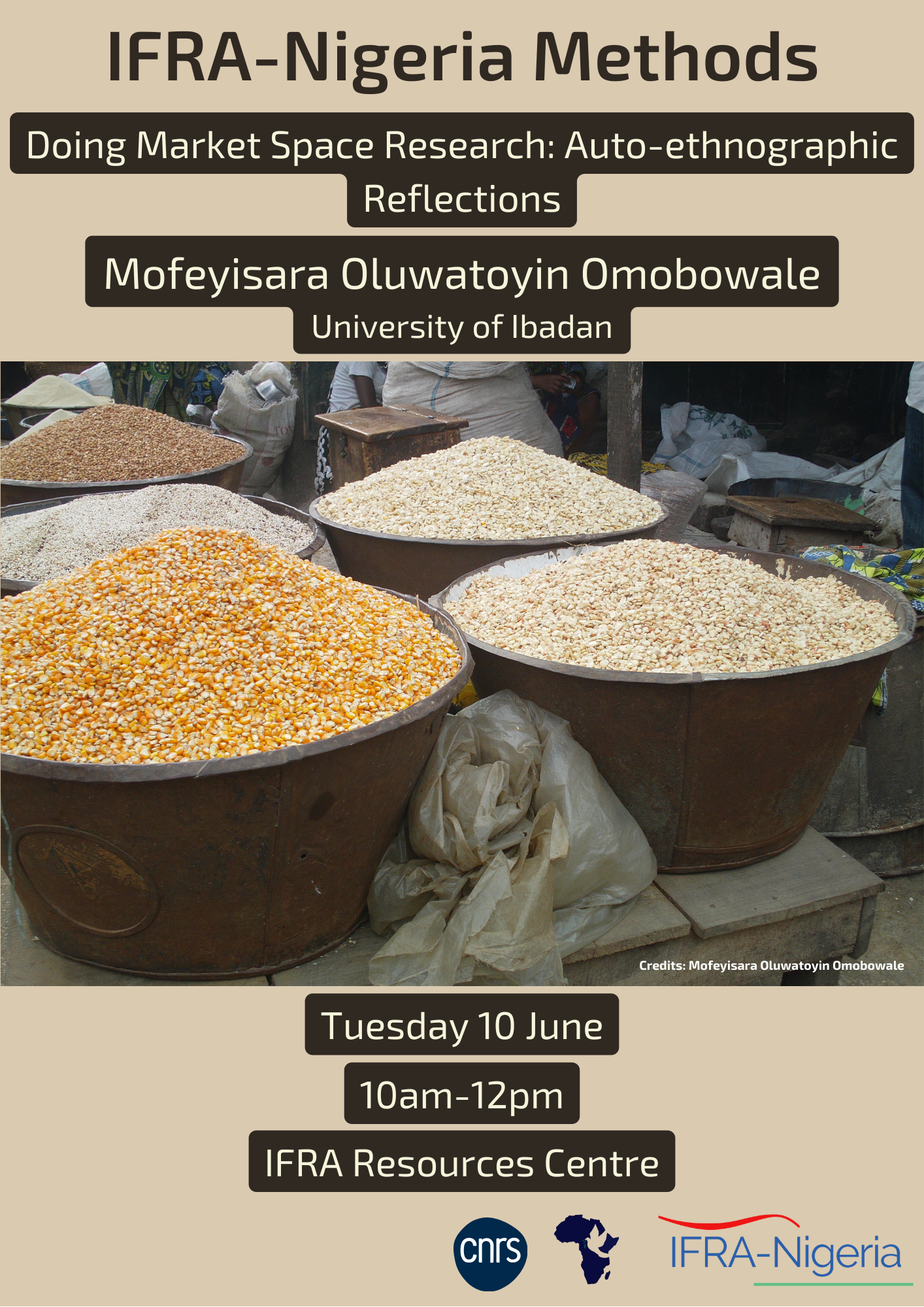 On 10 June 2025, Dr Mofeyisara Oluwatoyin Omobowale held a methodological seminar on "Doing Market Space Research: Auto-ethnographic Reflections" at IFRA-Nigeria Resources Centre. A Senior Research Fellow at the Social and Behavioural Health Unit of Institute of Child Health, College of Medicine at the University of Ibadan, she studies anthropology, public health, gender studies, child and adolescent health. She is a laureate, among other honors, of the American Council of Learned Societies-African Humanities Programme Doctoral Fellow in 2012 and Short Term Scholar, Brown International Advanced Research Institute (BIARI), Brown University (USA) in 2013.
On 10 June 2025, Dr Mofeyisara Oluwatoyin Omobowale held a methodological seminar on "Doing Market Space Research: Auto-ethnographic Reflections" at IFRA-Nigeria Resources Centre. A Senior Research Fellow at the Social and Behavioural Health Unit of Institute of Child Health, College of Medicine at the University of Ibadan, she studies anthropology, public health, gender studies, child and adolescent health. She is a laureate, among other honors, of the American Council of Learned Societies-African Humanities Programme Doctoral Fellow in 2012 and Short Term Scholar, Brown International Advanced Research Institute (BIARI), Brown University (USA) in 2013.
Continue Reading
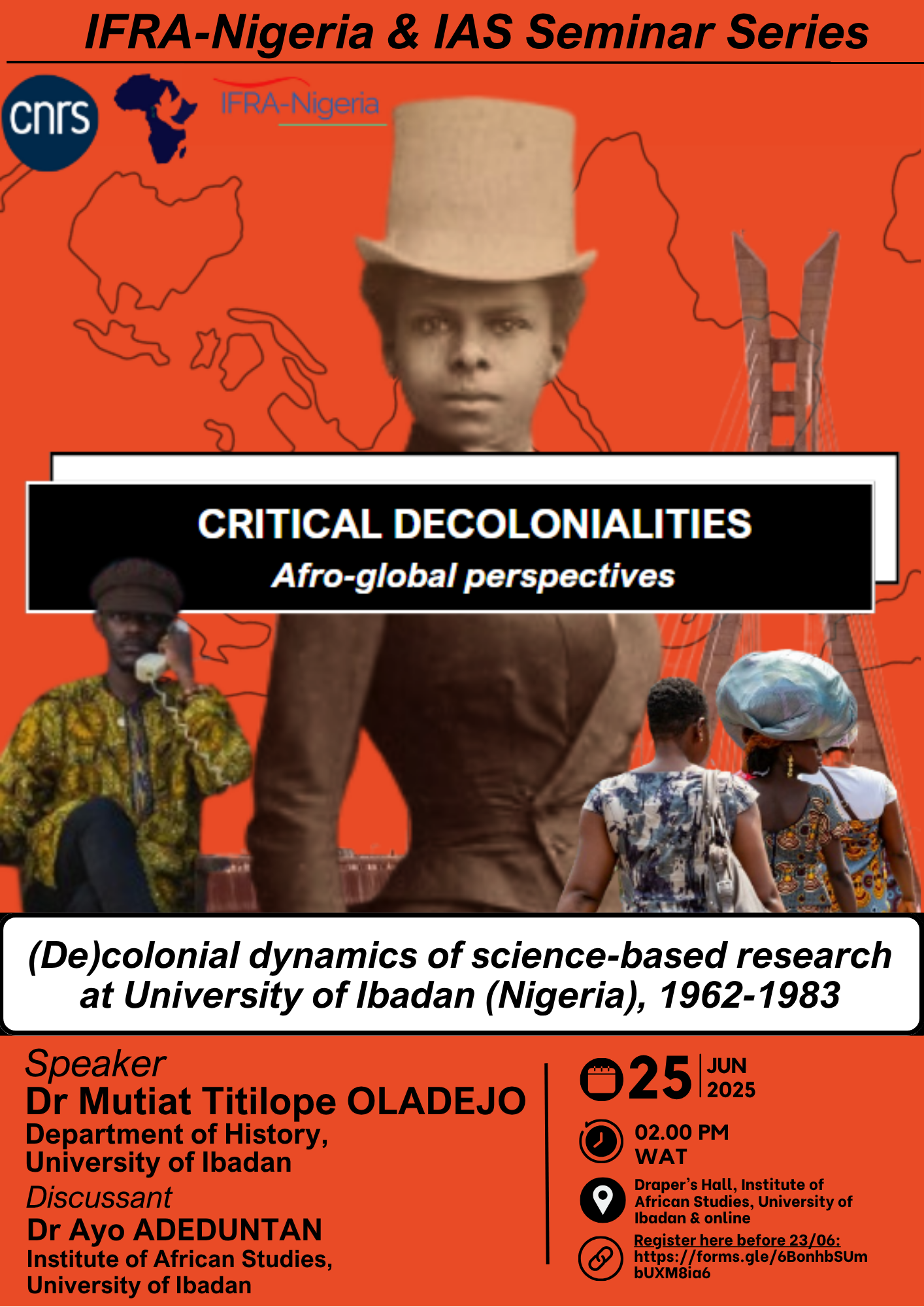 IFRA-Nigeria and the Institute of African Studies are pleased to invite you to the latest seminar of our "Critical Decolonialities : Afro-global perspectives" series on 25 June. We welcome Dr Mutiat Titilope Oladejo, who will talk to us about "(De)colonial dynamics of science-based research at University of Ibadan (Nigeria), 1962-1983".
IFRA-Nigeria and the Institute of African Studies are pleased to invite you to the latest seminar of our "Critical Decolonialities : Afro-global perspectives" series on 25 June. We welcome Dr Mutiat Titilope Oladejo, who will talk to us about "(De)colonial dynamics of science-based research at University of Ibadan (Nigeria), 1962-1983".
Universities in modern Africa evolved in the twentieth century as a colonial invention to fulfil the European civilisational agenda. Scholars have justified the establishment of universities as a project that exudes modernity and produces scientifically valid knowledge for human advancement. However, Africa has its rich human civilization that subsists over time in spite of modern sciences. With colonialism being an episode in African history, the African knowledge heritage suffices and also evolves with modern changes. Therefore, to what extent are Afrocentric considerations factored in the making of impactful scientific research at the University of Ibadan. Invariably, the University is taken as a site of research that exists in the frameworks of colonialism and decoloniality. The dynamics of (de)coloniality is unraveled in scientific-based research from 1962, when the University was relieved of its ‘special relationship’ status with University of London to 1983 when foreign funding interests declined.
Continue Reading


 Our next methodological seminar will take place on 9 December 2025. It will feature Dr Moruff Mudasiru, affiliated with the Department of Archeology and Anthropology of the University of Ibadan. He will present on the topic "Ethnography of Prayer Commodification: Field Encounters, Methodological Challenges, and Theoretical Reflections from Ibadan." Drawing on his experience studying
Our next methodological seminar will take place on 9 December 2025. It will feature Dr Moruff Mudasiru, affiliated with the Department of Archeology and Anthropology of the University of Ibadan. He will present on the topic "Ethnography of Prayer Commodification: Field Encounters, Methodological Challenges, and Theoretical Reflections from Ibadan." Drawing on his experience studying  On 16 October, 2025, Joel Abah, doctoral candidate at the Department of Peace, Security and Humanitarian studies at the University of Ibadan, presented his work on communities in Benue displaced camps during our latest methodological seminar "Maps, Memories, and the Craft of Ethnography: Using Participatory Tools in Displacement Research in Conflict-Affected Communities".
On 16 October, 2025, Joel Abah, doctoral candidate at the Department of Peace, Security and Humanitarian studies at the University of Ibadan, presented his work on communities in Benue displaced camps during our latest methodological seminar "Maps, Memories, and the Craft of Ethnography: Using Participatory Tools in Displacement Research in Conflict-Affected Communities". On 3 September 2025, Bérénice Busson, PhD student in geography at the Université Paris Cité (CESSMA Lab), held our first methodological seminar of the 2025-2026 academic year. She talked on "Exploring Hausa Urbanities in Lagos and Cotonou : Autoethnographic Reflections and Methodological Experiments".
On 3 September 2025, Bérénice Busson, PhD student in geography at the Université Paris Cité (CESSMA Lab), held our first methodological seminar of the 2025-2026 academic year. She talked on "Exploring Hausa Urbanities in Lagos and Cotonou : Autoethnographic Reflections and Methodological Experiments". IFRA-Nigeria and the Institute of African Studies are pleased to invite you to another session of the "Critical Decolonialities: Afro-global perspectives" seminar series scheduled for 31 July 2025. This session will feature Linda Chernis, GALA Queer Archives, University of the Witwatersrand, who will present on “Queer Archiving – a decolonial practice? The experiences of the GALA Queer Archive”.
IFRA-Nigeria and the Institute of African Studies are pleased to invite you to another session of the "Critical Decolonialities: Afro-global perspectives" seminar series scheduled for 31 July 2025. This session will feature Linda Chernis, GALA Queer Archives, University of the Witwatersrand, who will present on “Queer Archiving – a decolonial practice? The experiences of the GALA Queer Archive”. On 25 June, IFRA-Nigeria, in collaboration with the Institute of African Studies, University of Ibadan, hosted Dr Mutiat Titilope Oladejo (Department of History, University of Ibadan) and Dr Ayo Adeduntan (Institute of African Studies, University of Ibadan) for another edition of the “Critical Decolonialities” seminar series. The session, titled “(De)Colonial Dynamics of Science-Based Research at the University of Ibadan (Nigeria), 1962 - 1983,” explored the evolution of science-based research at the University of Ibadan (UI) through the dual lenses of colonial legacies and Afrocentric renewal.
On 25 June, IFRA-Nigeria, in collaboration with the Institute of African Studies, University of Ibadan, hosted Dr Mutiat Titilope Oladejo (Department of History, University of Ibadan) and Dr Ayo Adeduntan (Institute of African Studies, University of Ibadan) for another edition of the “Critical Decolonialities” seminar series. The session, titled “(De)Colonial Dynamics of Science-Based Research at the University of Ibadan (Nigeria), 1962 - 1983,” explored the evolution of science-based research at the University of Ibadan (UI) through the dual lenses of colonial legacies and Afrocentric renewal. On 10 June 2025, Dr Mofeyisara Oluwatoyin Omobowale held a methodological seminar on "Doing Market Space Research: Auto-ethnographic Reflections" at IFRA-Nigeria Resources Centre. A Senior Research Fellow at the Social and Behavioural Health Unit of Institute of Child Health, College of Medicine at the University of Ibadan, she studies anthropology, public health, gender studies, child and adolescent health. She is a laureate, among other honors, of the American Council of Learned Societies-African Humanities Programme Doctoral Fellow in 2012 and Short Term Scholar, Brown International Advanced Research Institute (BIARI), Brown University (USA) in 2013.
On 10 June 2025, Dr Mofeyisara Oluwatoyin Omobowale held a methodological seminar on "Doing Market Space Research: Auto-ethnographic Reflections" at IFRA-Nigeria Resources Centre. A Senior Research Fellow at the Social and Behavioural Health Unit of Institute of Child Health, College of Medicine at the University of Ibadan, she studies anthropology, public health, gender studies, child and adolescent health. She is a laureate, among other honors, of the American Council of Learned Societies-African Humanities Programme Doctoral Fellow in 2012 and Short Term Scholar, Brown International Advanced Research Institute (BIARI), Brown University (USA) in 2013. IFRA-Nigeria and the Institute of African Studies are pleased to invite you to the latest seminar of our "Critical Decolonialities : Afro-global perspectives" series on 25 June. We welcome Dr Mutiat Titilope Oladejo, who will talk to us about "(De)colonial dynamics of science-based research at University of Ibadan (Nigeria), 1962-1983".
IFRA-Nigeria and the Institute of African Studies are pleased to invite you to the latest seminar of our "Critical Decolonialities : Afro-global perspectives" series on 25 June. We welcome Dr Mutiat Titilope Oladejo, who will talk to us about "(De)colonial dynamics of science-based research at University of Ibadan (Nigeria), 1962-1983".
Social Media
Mailing List